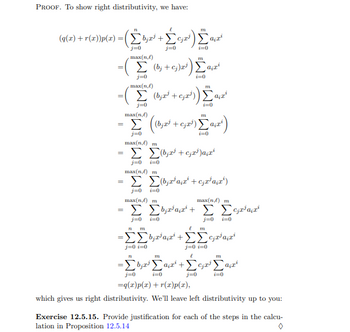
Advanced Engineering Mathematics
10th Edition
ISBN: 9780470458365
Author: Erwin Kreyszig
Publisher: Wiley, John & Sons, Incorporated
expand_more
expand_more
format_list_bulleted
Question
Please do Exercise 12.5.15 and please show step by step and explain

Transcribed Image Text:PROOF. Το show right distributivity, we have:
71
(q(z) + r(x))p(x) =(Σ+
j=0
-
-
||
-
max(n.)
Σ
j=0
max(n.) m
Σ Σ(bya + cal)*
j=0 =0
max(n,e) m
- Σ Σ(byzana + cjzatz)
j=0 t=0
mix(n,e) m
max(n.) m
Σ Σααρα + Σ Σφα
j=0
i=0
j=0 i=0
j=0
max(n.)
Σ (0;te)a) Samart
Σα
j=0
i=0
Gaj
max(nl)
TTL
Σ (bind tead)) Σαγα
j=0
i=0
ΤΕ 772
Σαμαρά
i=0
j=0 i=0
772
(bind test) Saint)
i=0
771
-ΣΣ+ΣΣτα
j=0 t=0
ι
ΤΟ
Τ
ΤΙΣ
-Στη Σα+Στη Σαμ
j=0
j=0
i=0
i=0
=q(x)p(a) + r(x)p(a),
which gives us right distributivity. We'll leave left distributivity up to you:
Exercise 12.5.15. Provide justification for each of the steps in the calcu-
lation in Proposition 12.5.14
![Proposition 12.5.14. Polynomials in R[x] have both right distributivity
across addition:
(q(x) +r(x))p(x) = q(x)p(x) +r(x)p(x),
and left distributivity across addition:
p(x) (q(x) +r(x)) = p(x)q(x) + p(x)r(x).](https://content.bartleby.com/qna-images/question/892e817a-9b32-4eeb-b8fc-5dd7ffde6479/39dc5b0c-4284-4639-9138-cb4cf09ffcc9/vosnw8c_thumbnail.png)
Transcribed Image Text:Proposition 12.5.14. Polynomials in R[x] have both right distributivity
across addition:
(q(x) +r(x))p(x) = q(x)p(x) +r(x)p(x),
and left distributivity across addition:
p(x) (q(x) +r(x)) = p(x)q(x) + p(x)r(x).
Expert Solution
This question has been solved!
Explore an expertly crafted, step-by-step solution for a thorough understanding of key concepts.
Step by stepSolved in 2 steps

Knowledge Booster
Similar questions
Recommended textbooks for you
 Advanced Engineering MathematicsAdvanced MathISBN:9780470458365Author:Erwin KreyszigPublisher:Wiley, John & Sons, Incorporated
Advanced Engineering MathematicsAdvanced MathISBN:9780470458365Author:Erwin KreyszigPublisher:Wiley, John & Sons, Incorporated Numerical Methods for EngineersAdvanced MathISBN:9780073397924Author:Steven C. Chapra Dr., Raymond P. CanalePublisher:McGraw-Hill Education
Numerical Methods for EngineersAdvanced MathISBN:9780073397924Author:Steven C. Chapra Dr., Raymond P. CanalePublisher:McGraw-Hill Education Introductory Mathematics for Engineering Applicat...Advanced MathISBN:9781118141809Author:Nathan KlingbeilPublisher:WILEY
Introductory Mathematics for Engineering Applicat...Advanced MathISBN:9781118141809Author:Nathan KlingbeilPublisher:WILEY Mathematics For Machine TechnologyAdvanced MathISBN:9781337798310Author:Peterson, John.Publisher:Cengage Learning,
Mathematics For Machine TechnologyAdvanced MathISBN:9781337798310Author:Peterson, John.Publisher:Cengage Learning,


Advanced Engineering Mathematics
Advanced Math
ISBN:9780470458365
Author:Erwin Kreyszig
Publisher:Wiley, John & Sons, Incorporated

Numerical Methods for Engineers
Advanced Math
ISBN:9780073397924
Author:Steven C. Chapra Dr., Raymond P. Canale
Publisher:McGraw-Hill Education

Introductory Mathematics for Engineering Applicat...
Advanced Math
ISBN:9781118141809
Author:Nathan Klingbeil
Publisher:WILEY

Mathematics For Machine Technology
Advanced Math
ISBN:9781337798310
Author:Peterson, John.
Publisher:Cengage Learning,

